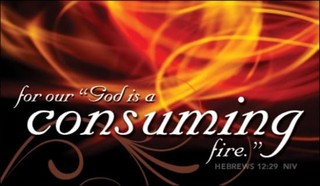
Change Translation
- Recent Translations
- All Translations
Images for Hebrews 12


Share

Share

Share

Share
Hebrews 12 Commentary
Chapter 12
An exhortation to be constant and persevere, The example of Christ is set forth, and the gracious design of God in all the sufferings believers endured. (1-11) Peace and holiness are recommended, with cautions against despising spiritual blessings. (12-17) The New Testament dispensation shown to be much more excellent than the Old. (18-29)
Verses 1-11 The persevering obedience of faith in Christ, was the race set before the Hebrews, wherein they must either win the crown of glory, or have everlasting misery for their portion; and it is set before us. By the sin that does so easily beset us, understand that sin to which we are most prone, or to which we are most exposed, from habit, age, or circumstances. This is a most important exhortation; for while a man's darling sin, be it what it will, remains unsubdued, it will hinder him from running the Christian race, as it takes from him every motive for running, and gives power to every discouragement. When weary and faint in their minds, let them recollect that the holy Jesus suffered, to save them from eternal misery. By stedfastly looking to Jesus, their thoughts would strengthen holy affections, and keep under their carnal desires. Let us then frequently consider him. What are our little trials to his agonies, or even to our deserts? What are they to the sufferings of many others? There is a proneness in believers to grow weary, and to faint under trials and afflictions; this is from the imperfection of grace and the remains of corruption. Christians should not faint under their trials. Though their enemies and persecutors may be instruments to inflict sufferings, yet they are Divine chastisements; their heavenly Father has his hand in all, and his wise end to answer by all. They must not make light of afflictions, and be without feeling under them, for they are the hand and rod of God, and are his rebukes for sin. They must not despond and sink under trials, nor fret and repine, but bear up with faith and patience. God may let others alone in their sins, but he will correct sin in his own children. In this he acts as becomes a father. Our earthly parents sometimes may chasten us, to gratify their passion, rather than to reform our manners. But the Father of our souls never willingly grieves nor afflicts his children. It is always for our profit. Our whole life here is a state of childhood, and imperfect as to spiritual things; therefore we must submit to the discipline of such a state. When we come to a perfect state, we shall be fully reconciled to all God's chastisement of us now. God's correction is not condemnation; the chastening may be borne with patience, and greatly promote holiness. Let us then learn to consider the afflictions brought on us by the malice of men, as corrections sent by our wise and gracious Father, for our spiritual good.
Verses 12-17 A burden of affliction is apt to make the Christian's hands hang down, and his knees grow feeble, to dispirit him and discourage him; but against this he must strive, that he may better run his spiritual race and course. Faith and patience enable believers to follow peace and holiness, as a man follows his calling constantly, diligently, and with pleasure. Peace with men, of all sects and parties, will be favourable to our pursuit of holiness. But peace and holiness go together; there can be not right peace without holiness. Where persons fail of having the true grace of God, corruption will prevail and break forth; beware lest any unmortified lust in the heart, which seems to be dead, should spring up, to trouble and disturb the whole body. Falling away from Christ is the fruit of preferring the delights of the flesh, to the blessing of God, and the heavenly inheritance, as Esau did. But sinners will not always have such mean thoughts of the Divine blessing and inheritance as they now have. It agrees with the profane man's disposition, to desire the blessing, yet to despise the means whereby the blessing is to be gained. But God will neither sever the means from the blessing, nor join the blessing with the satisfying of man's lusts. God's mercy and blessing were never sought carefully and not obtained.
Verses 18-29 Mount Sinai, on which the Jewish church state was formed, was a mount such as might be touched, though forbidden to be so, a place that could be felt; so the Mosaic dispensation was much in outward and earthly things. The gospel state is kind and condescending, suited to our weak frame. Under the gospel all may come with boldness to God's presence. But the most holy must despair, if judged by the holy law given from Sinai, without a Saviour. The gospel church is called Mount Zion; there believers have clearer views of heaven, and more heavenly tempers of soul. All the children of God are heirs, and every one has the privileges of the first-born. Let a soul be supposed to join that glorious assembly and church above, that is yet unacquainted with God, still carnally-minded, loving this present world and state of things, looking back to it with a lingering eye, full of pride and guile, filled with lusts; such a soul would seem to have mistaken its way, place, state, and company. It would be uneasy to itself and all about it. Christ is the Mediator of this new covenant, between God and man, to bring them together in this covenant; to keep them together; to plead with God for us, and to plead with us for God; and at length to bring God and his people together in heaven. This covenant is made firm by the blood of Christ sprinkled upon our consciences, as the blood of the sacrifice was sprinkled upon the altar and the victim. This blood of Christ speaks in behalf of sinners; it pleads not for vengeance, but for mercy. See then that you refuse not his gracious call and offered salvation. See that you do not refuse Him who speaketh from heaven, with infinite tenderness and love; for how can those escape, who turn from God in unbelief or apostacy, while he so graciously beseeches them to be reconciled, and to receive his everlasting favour! God's dealing with men under the gospel, in a way of grace, assures us, that he will deal with the despisers of the gospel, in a way of judgment. We cannot worship God acceptably, unless we worship him with reverence and godly fear. Only the grace of God enables us to worship God aright. God is the same just and righteous God under the gospel as under the law. The inheritance of believers is secured to them; and all things pertaining to salvation are freely given in answer to prayer. Let us seek for grace, that we may serve God with reverence and godly fear.
Hebrews 12 Commentaries
Footnotes 11
- [a] Or Jesus, the originator and perfecter of our faith.
- [b] Or Instead of the joy.
- [c] Some manuscripts read Think of how people hurt themselves by opposing him.
- [d] Greek sons; also in 12:7, 8 .
- [e] Greek son; also in 12:6, 7 .
- [f] Prov 3:11-12 (Greek version).
- [g] Or and really live?
- [h] Greek to something that can be touched.
- [i] Exod 19:13 .
- [j] Deut 9:19 .
- [k] Hag 2:6 .
Chapter Summary
INTRODUCTION TO HEBREWS 12
In this chapter the apostle presses to a constant exercise of faith and patience, amidst the various afflictions the saints are exercised with; delivers out several exhortations useful in the Christian life; and shows the difference between the legal and Gospel dispensations. Having in the preceding chapter given many illustrious instances and examples of faith, he makes use of this cloud of witnesses, as he calls them, to engage the Hebrews to drop their unbelief, and run with faith and patience the race set before them, Heb 12:1, and which he further urges from the example of Christ; from his concern in faith, being the author and finisher of it; from what he suffered when here on earth, both the contradiction of sinners, and the death of the cross, for the joy of having his people with him in heaven; and from his glorious state, being set down at the right hand of God. Whereas, as yet, they had not been called to shed their blood in their warfare against sin, Heb 12:2-4. And that they must expect chastisement, and should bear it patiently, he cites a passage of Scripture out of Pr 3:11,12 which suggests, that those who are the children of God, and are loved and received by him, are chastened and scourged, Heb 12:5,6. Wherefore this was no other than dealing with them as children; and should they not be thus dealt with, it would be an argument that they were bastards, and not sons, Heb 12:7,8. And next the apostle argues from the right of parents to chastise their children, and the subjection that is yielded to them; that if the corrections of them, who were the fathers of their bodies, were quietly submitted to; then much more should those of the Father of their souls; and the rather, since the chastenings of the former are only for temporal good, and according to their fallible judgments; whereas the latter are for spiritual profit, and an increase of holiness, Heb 12:9,10. And though it must be allowed, that no chastening, for the present time, is matter of joy, but of grief; yet the effects of them are the peaceable fruits of righteousness, to them that are exercised by them, Heb 12:11. Wherefore the apostle exhorts the believing Hebrews to encourage themselves and others under afflictions; and to behave in such manner, and carry it so evenly, that they might not be an occasion of stumbling to weak believers, Heb 12:12,13. He exhorts them in general to follow peace with all men, and particularly holiness; which is absolutely necessary to the beatific vision of God, Heb 12:14, and to take care that no heresy or immorality spring up among them, and be connived at, and cherished by them, to the troubling of some, and defiling of others, Heb 12:15, and particularly, lest the sin of uncleanness, or any sort of profaneness, should be found among them; of which Esau, the brother of Jacob, from whence they sprung, was guilty; whose profaneness lay in selling his birthright for a morsel of meat, and whose punishment was, that he should be deprived of the blessing; which decree was irrevocable, notwithstanding his tears, Heb 12:16,17 and to enforce these exhortations, the apostle observes to these believers, that they were not now under the law, but in a Gospel church state. The terror of the legal dispensation they were delivered from is described by the place where the law was given, a mount burning with fire; by circumstances attending it, blackness, darkness, and tempest, and the sound of a trumpet; by the matter of it, a voice of words, which they that heard, entreated they might hear no more; and by the effect the whole had upon. Moses himself, who quaked and trembled at what he saw and heard, Heb 12:18-21. The happiness of the Gospel dispensation, or of the Gospel church state, is expressed by the names of it, called Mount Zion, the city of the living God, the new Jerusalem; and by the company the saints have there, and their fellowship with them; angels innumerable; elect men, whose names are written in heaven, and whose spirits are made perfectly just; God the Judge of all, and Jesus the Mediator of the new covenant; whose blood being sprinkled on their consciences, spoke peace and pardon to them; such as neither Abel's blood nor sacrifice could speak, Heb 12:22-24. From whence the apostle argues, that care should be taken not to neglect and despise the voice of Christ, who is now in heaven, and speaks from thence in his Gospel and ordinances; seeing they escaped not who rejected him that spoke on earth, at Mount Sinai, which was shaken by his voice; and the rather, since it appears from a prophecy in Hag 2:6,7, that under the Gospel dispensation, not only the earth but the heavens would he shaken, Heb 12:25,26 which is an emblem of the shaking and removing the ordinances of the ceremonial law, that Gospel ordinances might take place, and remain for ever, Heb 12:27. Upon the whole, the apostle exhorts the believing Hebrews, that seeing they had received the immovable kingdom of grace, and were admitted into the Gospel dispensation, or church state; that they would hold fast the Gospel of the grace of God, and serve the Lord, according to his revealed will, with reverence and godly fear, which would be acceptable to him; or otherwise he would be a consuming fire; as he is to all the despisers and neglecters of his Gospel and ordinances, Heb 12:28,29.
Study Tools
PLUSUnlock Notes
This feature is for PLUS subscribers only. Join PLUS today to access these tools and more.
JOIN PLUSUnlock Highlights
This feature is for PLUS subscribers only. Join PLUS today to access these tools and more.
JOIN PLUSUnlock Bookmarks
This feature is for PLUS subscribers only. Join PLUS today to access these tools and more.
JOIN PLUSTrack Your Reading
Create a free account to start a reading plan, or join PLUS to unlock our full suite of premium study tools.